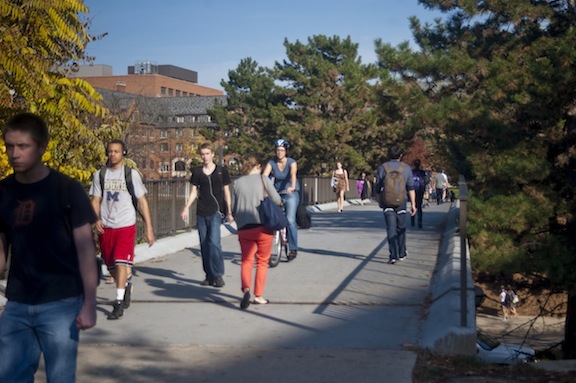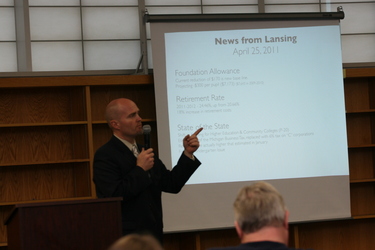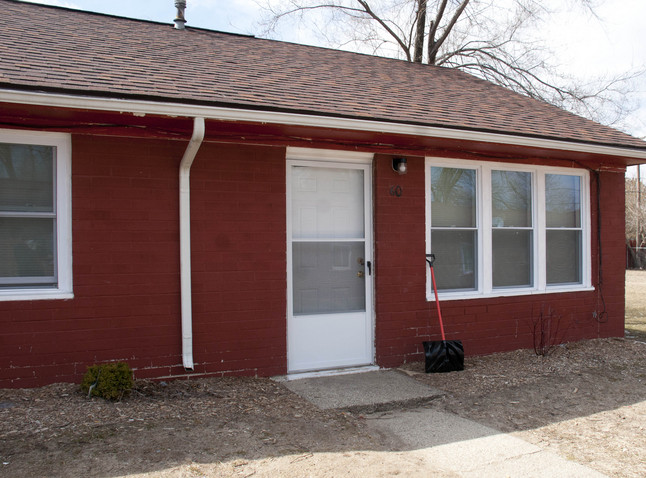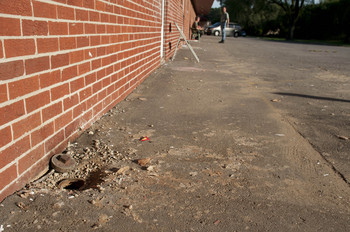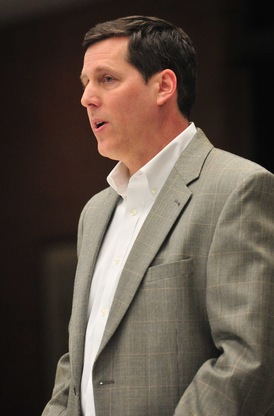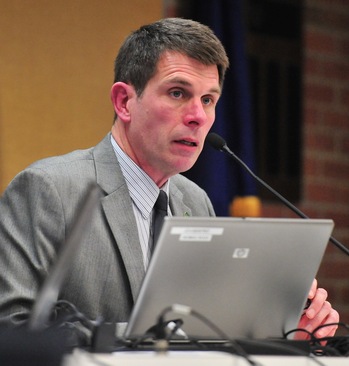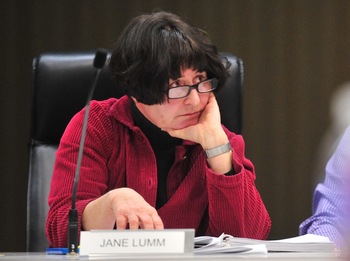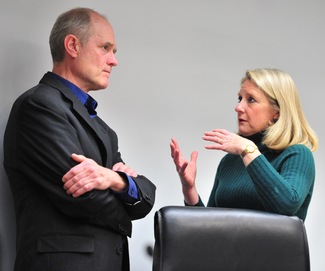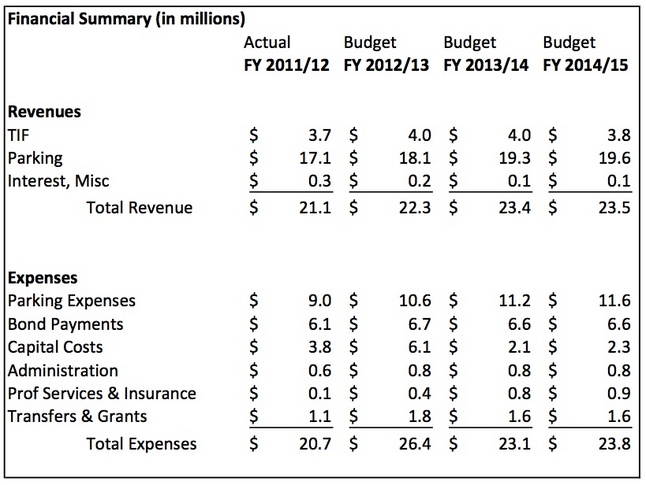Ann Arbor City Council members held the last of a series of budget work sessions Monday night, and they now await the city administrator's recommended budget in April.
A number of capital projects are being removed from the two-year budget plan in an effort to close the gap between revenues and expenditures starting July 1.
Tom Crawford, the city's chief financial officer, provided an overview of some of the changes, noting hundreds of thousands of dollars in planned fire station upgrades are being pushed back, with the exception of the addition of separate female showers and locker rooms.
![Tom_Crawford_022513_RJS.jpg]()
Tom Crawford, the city's chief financial officer, appears before council members at a recent meeting.
Ryan J. Stanton | AnnArbor.com
Meanwhile, a major renovation of the second floor of city hall, including complete remodel of the council chambers, has been removed from the budget for 2014-15.
Mayor John Hieftje said as long as the council chambers is safe, it's fine, though he would like to see improved accommodations for people with disabilities.
"About the only change I've seen in it is we painted these panels up here," he said, pointing toward the ceiling after the meeting. "But we still have two-by-fours holding up the counters, at least back where the mayor sits, but it's perfectly adequate for us to continue to use."
The city also has modified its assumptions regarding the future of city-owned property at 415 W. Washington, where the city hopes to establish a greenway park.
The city's Capital Improvement Plan had assumed a $650,000 cost for the re-use of the deteriorated building there as a community arts center, and now the city assumes it will be demolished.
"That is a reduction of about $350,000," Crawford said.
About $500,000 worth of concrete repairs that were planned for Superior Dam in 2014-15 also are being pushed back another year.
Train station design delayed
City Administrator Steve Powers confirmed Monday night a $2.6 million line item for final design of a new train station, possibly on Fuller Road, is being pushed back one year to fiscal year 2015-16.
That brought smiles to the faces of at least two councils members who have questioned the project: Jane Lumm and Stephen Kunselman.
Both said they were ready to bring forward budget amendments to halt the design if it showed up in the administrator's budget next month, so they're glad to know it won't be there.
"Hearing this is certainly good news," Lumm said, adding she's also glad to see hundreds of thousands of dollars in improvements to city hall removed for now.
Crawford said the city decided it can delay doing a $200,000 primary chiller replacement inside city hall in 2014-15, since the city is spending $175,000 to add a secondary chiller in 2013-14 anyway. If the primary chiller fails, he said, the new secondary chiller can kick in.
Hieftje, who has been a major proponent of building a new train station on Fuller Road, said he's not disappointed to see the final design delayed a year.
"The federal wheels turn slowly, and frankly I think it's not a bad thing to happen," he said. "One of the things I've thought about for a very long time is it's sometimes hard for people to visualize how robust service is going to be with Amtrak going over 100 mph with brand-new trains, really reducing the transit times and providing a dependable trip east to west, and getting rid of the roadblocks."
As more time passes, Hieftje said, the increased demand for service will be more apparent. He said he's heard from Amtrak that ridership could double.
"Which would completely overwhelm our current station," he said.
Closing fire stations vs. adding firefighters
Even though Hieftje and a number of council members have voiced opposition to closing fire stations, it's an idea that doesn't seem to go away.
Included in the council's meeting packet was a five-page memo from Powers indicating it's an option he's still considering.
![Steve_Powers_Feb_2013.jpg]()
City Administrator Steve Powers
Ryan J. Stanton | AnnArbor.com
But Powers also noted after Monday's meeting that renovations to reopen Station 2 (and have it be one of three remaining stations if the city switches from a five-station model to a three-station model) no longer are included in the tentative budget plan for the next two fiscal years.
Given current staffing levels, Fire Chief Chuck Hubbard favors the switch to three stations, which would ensure a minimum of four firefighters on duty at each station. That would help make sure four firefighters arrive on scene together, which is preferred when responding to fires.
But instead of closing stations, Hubbard has said he'd rather increase staffing levels and have four firefighters on duty at each of the five existing stations.
According to Powers' memo, the fire department would need to hire 12 more firefighters to achieve that. The department has 86 full-time employees now.
The cost of those 12 firefighters for the first year would be $936,963, plus a $121,536 one-time cost for equipment. Year 2 costs would be $991,518, growing to $1,048,751 by Year 5.
Powers said he's confident in those numbers, which clash with projections Hubbard provided last year. Hubbard said last March it would take hiring at least 30 more firefighters at a cost of $3 million a year to increase the daily staffing levels from three to four firefighters at each substation.
Hieftje and Powers both expressed a desire for greater collaboration with surrounding fire departments during Monday's meeting. Hieftje said he's working with Yousef Rabhi, the new chairman of the county board, to resurrect the Washtenaw Metro Alliance to take a closer look at that.
"I'm confident we're going to be in good shape keeping the stations we have, but there's a great deal of promise in further collaboration with other departments in moving toward regionalization," Hieftje said. "I think we can both save money for taxpayers and provide better fire services."
Lumm said she's ready to propose an increase in police and fire staffing for next year if she doesn't like what she sees in the administrator's budget.
"My expectation is that council's goals for public safety will be reflected in the budget," she said. "And when you establish priorities, you do more of something and less of something else."
Lumm doesn't support closing fire stations.
"I know we don't have adequate staffing at all the stations, obviously," she said. "But when the locations were established decades ago, they were strategically placed. It's a big leap to walk away from that and conclude that we can close some of these."
Fall leaf pickup and holiday trees
Lumm said she's planning to bring forward amendments to restore fall leaf pickup and holiday tree collection services if they're not included in the administrator's budget.
![Jane_Lumm_022513_RJS.jpg]()
Council Member Jane Lumm
Ryan J. Stanton | AnnArbor.com
It's estimated restoration of fall leaf pickup services would increase annual costs in the solid waste fund by $285,000 and the city would incur an additional one-time cost of $395,000, while restoration of holiday tree collection services would increase annual costs by $26,000.
Lumm, who fought unsuccessfully to restore those services last year, said she can't understand how in a general fund budget totaling more than $80 million the city can't find at least $26,000.
She believes it would be less costly for city residents and would leave a smaller carbon footprint if the city's trucks go around and pick up holiday trees, instead of having thousands of residents individually haul their trees out to the city's drop-off station on Ellsworth Road.
"I thought about that when we dropped ours off and there was the mountain of trees, and I thought, 'OK, each one of these is a car coming out here,' " she said.
"And as we've seen with the limb/tree debris cleanup after this last storm, that's a really nice thing that the city's doing," she said. "A lot of neighborhoods would appreciate this service."
Hieftje, who supported eliminating fall leaf pickup and holiday tree collections in 2010, said he's happy to talk about restoring such services if Lumm can find the money in the budget. But he guessed only half the residents in Ann Arbor have holiday trees, and if they're able to go out and pick them up in the first place, he said, it seems they should be able to haul them away on their own.
New budget forecast
Crawford provided council members with a revised general fund forecast, showing a slightly more positive outlook than before.
"We completed our revised tax estimates for the year and have about $190,000 in additional general fund revenues we anticipate, so that was good news," he said.
Crawford said the 15th District Court also revised its budget and now expects $220,000 in additional revenue, while court expenses have gone down $60,000.
If every remaining budget request is granted, the general fund would operate at a $275,000 deficit in the coming year, which means city officials still have some tough decisions to make.
![John_Hieftje_Sally_Hart_Petersen_031813.jpg]()
Mayor John Hieftje chats with Council Member Sally Hart Petersen, D-2nd Ward, before the start of a meeting.
Ryan J. Stanton | AnnArbor.com
But that's better than a month ago when the projections showed the general fund would operate at a $950,000 deficit next year if all requests were funded.
The city still is projecting $82.3 million in recurring revenues and $80.8 million in baseline recurring expenses for next year. That leaves a $1.48 million surplus to start in the general fund.
From there, city officials are considering $231,000 worth of additional recurring funding requests (down from $698,000 a month ago). Additionally, city officials are considering $1.5 million in one-time expenses (down from $1.7 million a month ago).
The projections for the second year of the two-year budget plan show the city operating at a $1.75 million deficit if every remaining budget request is funded.
If the city ran those deficits, it still would have uncommitted cash reserves totaling nearly $12.1 million two years from now, which is considered within acceptable range.
The council also was presented with a budget plan from the Ann Arbor Downtown Development Authority at Monday's meeting.
DDA officials said there are no downtown parking rate increases planned in the next year, but there is more parking coming online with the opening of the new First and Washington garage. As a result, parking revenues are budgeted to jump from $18.1 million to $19.3 million in the next year.
The DDA's budget shows significantly lower tax revenues than city officials anticipate based on new downtown developments coming onto the tax rolls.
One chart city officials referenced shows DDA tax captures growing as high as $4.8 million in 2014-15, which Kunselman and Council Member Sumi Kailasapathy want to scale back.
The City Council is expected to hold public hearings on May 6 and vote on a final budget at its May 20 meeting. The administrator's budget is due by April 15.
![Ann_Arbor_DDA_budget_2014-15.jpg]()
The Ann Arbor Downtown Development Authority's projections for the next two years.
Ann Arbor DDA
Ryan J. Stanton covers government and politics for AnnArbor.com. Reach him at ryanstanton@annarbor.com or 734-623-2529. You also can follow him on Twitter or subscribe to AnnArbor.com's email newsletters.



